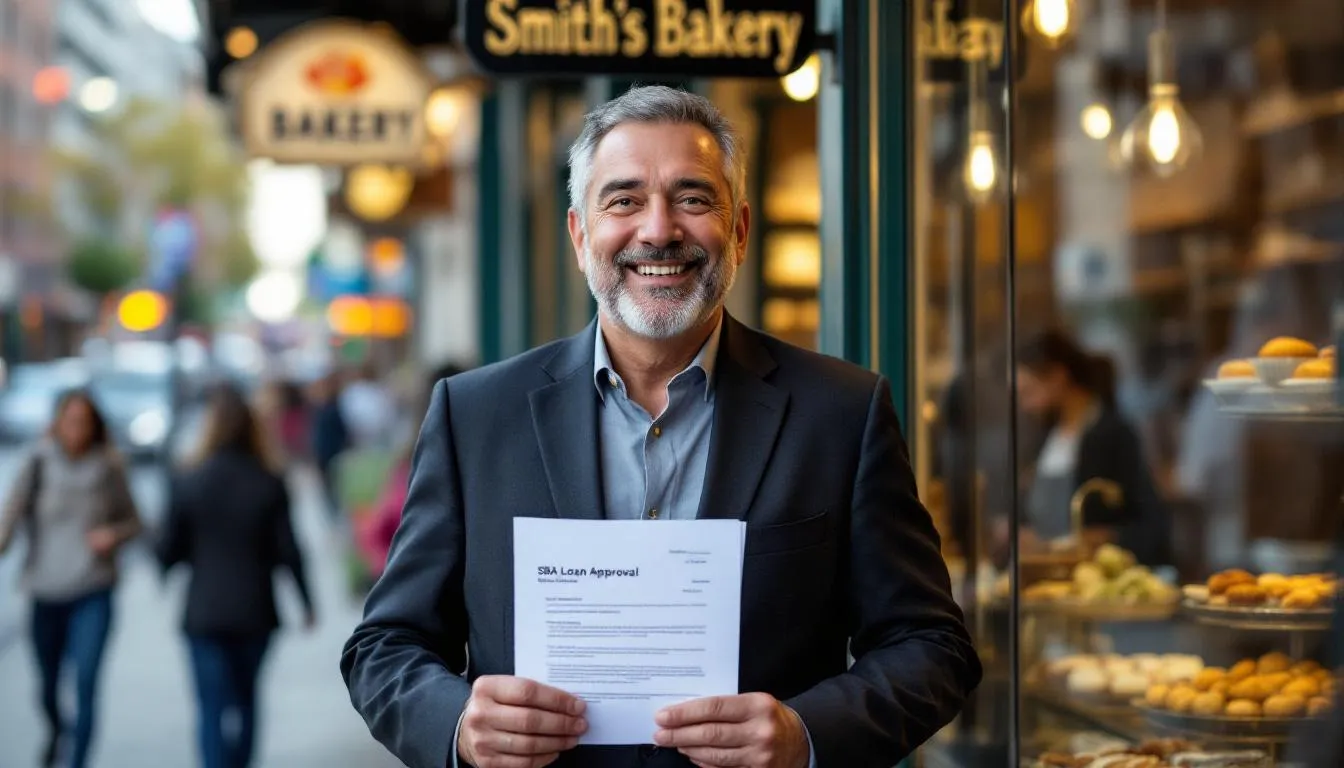What are SBA Loans?
SBA loans are made available through the US Small Business Administration (SBA). The SBA partially guarantees SBA loans, enabling lenders to offer borrowers high loan amounts at lower interest rates and longer repayment terms. If the borrower defaults, the federal government pays for the guaranteed portion.
There are multiple financing packages available within the SBA loan program. Small business owners apply to the specific loan program that meets their business needs.
SBA loan options include:
-
SBA 7(a) loans (the most common).
-
SBA Economic Injury & Disaster loans (EIDL).
-
SBA Microloans.
The various SBA loan options offer funding for a wide range of business purposes. Small businesses can use SBA loan proceeds for:
-
Purchasing equipment, machinery, and other fixed assets.
-
Refinancing business debt.
-
Growing an export business.
-
Recovering from a natural disaster (EIDL loans).
-
Startup funding (SBA microloans only).
The SBA does not approve loan applications or provide funding. Instead, potential borrowers apply to an SBA-approved lender, which will be one of three types of financial institutions: commercial banks, credit unions, or alternative online lending facilitators, such as United Capital Source.
Once you apply to an SBA-approved lender, the SBA signs off on the loan. SBA-preferred lenders can approve loan requests without obtaining SBA approval first.
Closing and funding the loan can take anywhere from a few weeks to 120 days, depending on the type of loan. Documentation issues can cause additional delays.
What is the SBA Loan Approval Rate?
Approval rates for SBA loans vary by the type of institution. Here are the current approval rates by lending institution type:
-
Alternative online lenders: 57%.
-
Small banks: 49%.
-
Credit unions: 40%.
-
Large banks: 25%.
What are the most common reasons for SBA Loan Denial?
One of the more challenging aspects of the SBA loan application process is that you must meet both SBA and lender requirements. The SBA does not set minimums for personal credit scores, time in business, or revenue. It does, however, set basic eligibility and FICO SBSS requirements.
Even if you meet the SBA’s requirements, each lender sets its own credit score, time in business, and revenue requirements. So, either the SBA or the lender can deny the application if the requirements aren’t met. It’s crucial to understand the SBA loan process before applying to avoid a potential denial.
Here are the most common reasons why SBA loans are denied.
Didn’t Meet SBA’s Basic Eligibility
Small businesses must meet these standards:
-
Be a for-profit business.
-
Operate and be physically located in the US or its territories.
-
Meet the small business size standards as defined by the SBA.
-
Have the cash flow to handle loan repayments.
-
Not be eligible for or receive loan funds elsewhere (SBA loans are “last resort financing”).
-
Have invested time and money (equity) into the business.
-
Possess a commitment to success and relevant management experience.
-
Provide a personal statement attesting to having good character.
-
Cannot be incarcerated, on parole, or on probation.
-
Cannot be currently under indictment or other forms of criminal charges.
-
Cannot have previously defaulted on federal loans, such as student loans.
-
Must own at least 20% of the company.
Didn’t Meet Business Credit Requirements
You need to establish business credit before applying for an SBA loan. The SBA uses FICO SBSS scores to analyze a company’s credit.
The SBSS aggregates the personal credit scores of up to five business owners (each with a minimum of 20%), the business credit score of the company, and financial data provided on Forms 1919 and 1920.
The current SBSS minimums are:
-
7(a) Small Loans: 150.
-
Community Advantage: 140.
-
Express Bridge Loan Pilot Program: 130.
Low Credit Score
Lenders often decline SBA loans due to low personal or business credit scores. Most business owners need good to excellent personal and business credit scores to qualify for an SBA loan. The general personal credit score range is 650-700.
The exact minimum credit score requirement depends on the lender and the SBA loan. Even if you meet the credit score requirement, specific adverse reports in your credit history could trigger a denial.
For example, a recent bankruptcy report might be a red flag for lenders. Also, if you previously defaulted on a government loan, such as a student loan, you won’t be eligible for an SBA loan.
Too Much Debt
When applying for an SBA loan, two critical financial metrics lenders evaluate are the Debt Service Coverage Ratio (DSCR) and the Debt-to-Income Ratio (DTI). These ratios help lenders assess a business’s ability to manage debt and ensure the loan won’t overextend the company financially.
The Debt Service Coverage Ratio (DSCR) measures a business’s available cash flow to cover its debt obligations. Most SBA lenders require a DSCR of at least 1.25. In practical terms, this means the business generates $1.25 in net operating income for every $1.00 of debt payments due (both principal and interest).
The Debt-to-Income Ratio (DTI) is another vital indicator. However, it’s more often used when evaluating the personal finances of the business owner, especially for sole proprietors or small partnerships. DTI compares your monthly debt obligations to your monthly gross income.
For SBA loans, lenders typically look for a debt-to-income ratio (DTI) below 50%. This means your total monthly debt payments on personal loans, including mortgages, car loans, credit cards, and other obligations, should be no more than half your gross monthly income.
Inadequate Cash Flow
Cash flow is one of the most important qualifiers for SBA loans. The SBA’s guidance to lenders states:
“The cash flow of the Applicant is the primary source of repayment, not any expected recovery from the liquidation of collateral. Thus, if the Lender’s financial analysis indicates that the Applicant lacks reasonable assurance of timely repayment from the business’s cash flow, the loan request must be declined, regardless of the collateral available or outside sources of repayment.
Put simply: if your business has insufficient cash flow to support repayments, you can’t get an SBA loan.
Not Enough Collateral
Most lenders require collateral for SBA loans. Generally, collateral requirements are as follows:
-
Loans up to $25,000: no collateral requirement.
-
Loans between $25K and $350k: Follows the lender’s collateral requirements for non-SBA loans.
-
Loans over $350: Collateralized to the “maximum extent possible.”
The SBA states that lenders cannot deny an application based solely on collateral. However, it can contribute to denial if other factors are borderline. In some cases, you may be able to use personal assets for collateral.
Equity Injection, aka Down Payment
Most SBA loans require a minimum down payment of 10% of the loan amount. The SBA prefers to work with businesses that can contribute equity to the loan. In this way, all three parties share some risks – the borrower, the SBA, and the lender.
If you can’t come up with a down payment, you might not get approved. There are some exceptions, but expect to put at least 10% down for the most part.
Time in Business
Most lenders require at least two years of business experience, but some exceptions may apply. For example, the SBA microloan is the most commonly used for startups, and most lenders offering it don’t require the same level of time in business.
Annual Revenue
Not every lender sets an annual revenue requirement; however, it is best to have a yearly revenue of at least $ 250,000. Again, though, the specific loan you’re applying for might have a different revenue requirement.
Missing Information
Incomplete applications can result in automatic denial for SBA loans. Ensure you complete any SBA loan application in its entirety and submit all required documentation. Missing documents can also create significant delays.
How can I appeal an SBA Loan denial?
The SBA does provide an appeal process if you believe you were denied in error. In most cases, you must file your appeal with the SBA’s Office of Hearings and Appeals within 45 days of your denial.
The deadline to appeal might be different for some SBA loans. Be sure to check with the SBA to determine your specific appeal deadline.
When preparing an appeal, the first step is to determine the reason for the denial. Lenders are required to explain the rejection in the denial letter. For more information, please get in touch with the lender.
Once you understand the reason for the denial, gather the necessary documentation to support the claim that the rejection was incorrect. For example, if you were denied due to cash flow issues, you’ll need cash flow statements proving you can support repayments.
After preparing your documentation and appeal argument, you can file the appeal through the Hearings and Appeals Submission Upload Application, by email, or by fax.
Appeals typically take 90 days to process. Some programs, such as SBA disaster loans, have extended deadlines for appeals. You have up to 6 months to file an SBA disaster loan appeal with the SBA Disaster Assistance Processing and Distribution Center (DAPDC).
How to Apply for an SBA Loan:
If you are looking to apply, or reapply, for an SBA loan, you can follow these steps to apply through our lender network.
Step 1: Ensure You Qualify
You’ll need a credit score between 650 and 700 and a healthy, consistent cash flow. How you intend to use the money also plays a significant role. You’ll need a detailed business plan of how the funds will help you invest in and grow the company.
Step 2: Gather Your Documents
Be prepared to provide:
-
Driver’s License.
-
Business license or certificate.
-
Voided Business Check (for business bank account information).
-
Bank Statements.
-
Credit Report/Statement of Personal Credit History.
-
Business Tax Returns.
-
Credit Card Processing Statements.
-
Personal Tax Returns – 3 Years.
-
Business Tax Returns – 3 Years.
-
Business Plan (Not in all cases).
-
Personal Financial Statement.
-
List of Real Estate Owned or Business Leases, if applicable.
-
Debt Schedule/Loan/Rent/Lease Documentation
-
Deeds/Title/Ownership documentation for any collateral/Security
-
Current Profit & Loss Statements and Balance Sheet Year-to-Date
-
A/R and A/P Reports
-
United Capital Source 1 Page Application
Step 3: Fill Out the Application
You can begin the application process by calling us or filling out our one-page online application. Either way, you’ll be asked to enter the information from the previous section along with your desired funding amount.
Step 4: Speak to a Representative
Once you apply, a representative will reach out to you to explain the repayment structure, rates, and terms of your available options. This way, you won’t have to worry about any surprises or hidden SBA fees during repayment.
Step 5: Receive Approval
SBA Loans through our network generally take 3-5 weeks to process. Once approved and your file is closed, funds should appear in your bank account in a few business days.
What are the benefits of SBA Loans?
SBA loans are widely regarded as one of the most attractive financing options available to small business owners. Their standout feature is the exceptionally low interest rates, which are often the deciding factor for entrepreneurs comparing funding choices. While traditional bank term loans can also offer competitive rates, they typically don’t drop below 5%, making SBA loans even more appealing in comparison. In contrast, alternative or short-term financing options can carry sky-high APRs—sometimes reaching up to 99%.
Beyond low rates, SBA loans also provide generous borrowing amounts and long repayment terms. These features make them especially useful for business owners preparing for significant investments or growth initiatives. The extended terms and affordable interest charges make it easier to take on larger projects without putting undue pressure on your day-to-day cash flow. Unlike higher-cost financing, which may force tough budget decisions, SBA loans allow you to manage repayments while continuing to fund regular operations. For businesses seeking to maximize their return on investment, SBA financing often offers the most strategic path forward.
What are the drawbacks of SBA Loans?
Anyone exploring business financing options quickly learns that the most favorable loans often come with the toughest qualifications. SBA loans, known for their competitive rates and borrower-friendly terms, are no exception; they’re among the most difficult to qualify for.
Many business owners assume that since the SBA backs a significant portion of the loan, lenders should be more flexible compared to traditional business term loans. While it’s true the SBA provides a guarantee, often up to 85%, that still leaves lenders with risk. As a result, banks and lenders remain cautious and maintain high standards. So, if you’re unlikely to qualify for a conventional term loan, it’s doubtful you’ll meet the stricter criteria for an SBA loan.
One of the biggest hurdles is the lack of standardized eligibility requirements. Each lender partnering with the SBA sets its own approval criteria, meaning qualifications can vary significantly. Some lenders may prioritize specific industries or prefer working with larger, well-established companies with strong financials, particularly traditional banks.
It’s also important to know that applying for an SBA loan is a time-consuming process. The paperwork can be extensive, and approvals often take several weeks or even months to process. It’s not unusual for applicants to consult multiple lenders or be advised to wait and improve their financial standing before trying again. Simply put, securing an SBA loan isn’t a quick or easy task—it often requires persistence, preparation, and patience.
SBA Loan Pros & Cons
Pros:
-
💰 Low Interest Rates – Among the most affordable financing options available.
-
📆 Long Repayment Terms – Easier monthly payments over extended periods.
-
📈 High Borrowing Limits – Ideal for significant investments and growth opportunities.
-
🔄 Improves Cash Flow Management – Lower payments reduce strain on operating expenses.
-
📊 Maximizes ROI – Suitable for businesses looking to make strategic, high-impact investments.
Cons:
-
🏦 Strict Eligibility Requirements – Harder to qualify than many expect.
-
📄 Heavy Documentation – The Application process involves lots of paperwork.
-
⏳ Slow Approval Timeline – Can take several weeks or months to get approved.
-
🧩 Inconsistent Lender Criteria – Approval standards vary from one lender to another.
-
🚪 Limited Access for Newer or Smaller Businesses – Preference often goes to well-established companies.
SBA Loan Denied Frequently Asked Questions
Here are some of the most common questions about responding to an SBA loan denial.
How soon can I reapply after my SBA loan was denied?
For most SBA loans, you can apply again within 90 days of submitting your application. However, we caution you to consider several vital factors before reapplying after having a business loan denied.
The most important thing is to ensure you rectify the reason for the denial. Reapplying without addressing the issues will cause more frustration and another denial.
Secondly, most lenders perform a hard credit inquiry for SBA loans. You might want to wait a little longer to give your credit score a chance to bounce back. Too many recent credit inquiries can result in a credit denial.
Finally, reconsider your lender. Some lenders offer more lenient qualifications or are more willing to work with you to refine your application.
What can I do to improve my SBA Loan application?
The first things to focus on improving are the “5 Cs of Lending:”
-
Capacity: Ensure you have the revenue, cash flow, and sustainability to support repayments.
-
Capital: You can increase your capital by investing more equity in your business and securing the necessary funds for the equity injection or down payment for the loan.
-
Collateral: The more assets you can pledge as collateral, the less risk for lenders.
-
Conditions: Lenders want to ensure your business is viable and sustainable. Improving business plans and financial statements helps show you’re in a viable market.
-
Character: Most SBA applications require a personal statement that can demonstrate you have good character and are a responsible person.
It’s a good idea to review all of your business finances to understand how much debt your business can afford. Consider options to combat poor credit, such as paying off existing debt to lower your credit utilization ratio. Review other business resources or ways to reduce other business expenses.
What are my Small Business Loan Alternatives to SBA Loans?
Ultimately, SBA loans may not be the best option for every small business. You may need to establish a stronger business history or credit to qualify. Other times, you could be “too qualified” and be eligible for credit elsewhere.
In any case, plenty of small business loans and alternative financing options are available. In some cases, you might consider business credit cards. Alternative lenders provide more accessible business loans than traditional lenders.
Consider any of the following funding solutions for your business:
SBA Loan Approval Rate & Denial – Final Thoughts
You’re not alone if you applied for an SBA loan and were denied. Most small businesses struggle to qualify, with over 50% of applicants being rejected.
You can take concrete steps to improve your application, whether applying for the first time, trying to appeal a denial, or reapplying for a loan. Following the steps above will help you boost your approval odds.
One of the most beneficial ways to help qualify for an SBA loan is to work with an SBA lender that will help you with your application. At United Capital Source, our loan executives understand what the SBA lenders in our network are looking for. Contact us if you want to apply for an SBA loan or have additional questions.
















